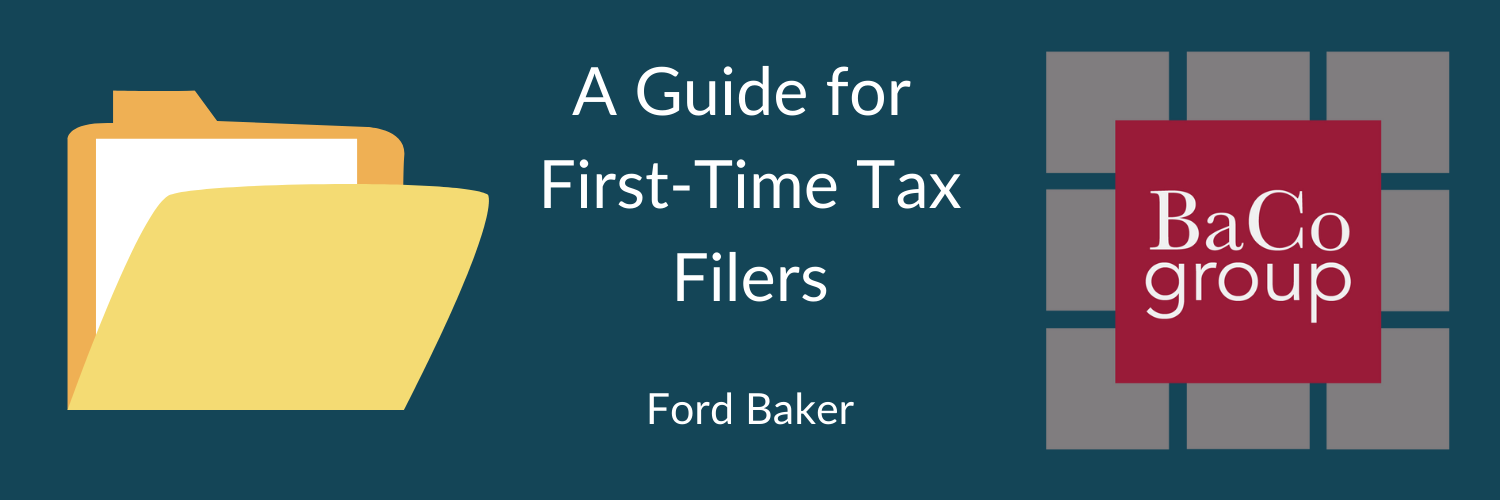

Are you filing taxes for the first time this year? Do you feel confused or lost about how to file your taxes? Don’t worry! BaCo Group is here to help. We’ve created a short guide for first-time tax filers so you know what to do for this year’s tax season. Keep reading to find out the best way to go about filing your taxes as a newly claimed independent.
Choose How to File
There are a couple of ways to file your taxes. One way is online with tax software. The other way is by hiring a professional like the CPAs at BaCo Group. Tax software is very easy to use, and even if you get stuck, there’s usually a way to contact human preparers. This could be a good option for your first time filing; however, as you get older and your finances get more complex, you might consider hiring a professional to make sure everything is being done correctly. Therefore, it might be a good option to hire a professional the first time so you can continue that relationship as your life and finances change.
Understand How Taxes are Determined
Whether you file online or with a professional, you should understand how your taxes are determined. It’s important to be knowledgeable about your finances.
The government decides your taxes based on a progressive tax system, so your taxable income is divided into chunks called tax brackets, and each chunk is taxed at a corresponding rate. This means that you won’t ever pay one single rate for your entire income. Some will be taxed at a lower rate than other “chunks.”
Gather Information
You’ll need tax information whether you’ve hired a professional or you’re filing for yourself using software. It’s important to collect your information as it comes in, so it’s easy to find and keep up with when tax season rolls around. Examples of possible documents and information you’ll need to file taxes include:
- Social security numbers
- W-2 forms
- 1099 forms
- Retirement account contributions
- Property taxes and mortgage interest.
- Charitable donations.
- State and local taxes you paid.
- Educational expenses.
- Unreimbursed medical bills.
- Last year’s federal and state tax returns.
If You Owe Taxes
There are multiple ways to pay taxes to the IRS. These include electronic payments, wire transfers, debit and credit cards, checks, and even cash if you prefer that method. If you can’t pay the amount you owe in full, a payment plan through the IRS might be an option for you as well. There are short-term and long-term payment plans, but no matter which you choose, you’ll typically make monthly payments until you settle what you owe.
If You’re Receiving a Refund
There are a few things you can do to make sure you receive your refund as quickly as possible.
- Avoid filing by paper. If you file your tax return by paper, it will likely be 6 to 8 weeks before your return is processed. However, when you file online, your return is likely to be processed in about three weeks.
- Use direct deposit. Direct deposit is the fastest way to receive your refund. By using this method, the IRS can deposit your refund directly into your bank account instead of waiting for a paper check in the mail.
- Use tracking. You can track the status of your IRS refund and your state refund online. This won’t necessarily get your refund to you faster, but at least you’ll know where it is and when it can be expected to arrive.
If it’s your first time filing taxes this year, contact the BaCo Group! We can refer you to the perfect accountant to help you file your personal tax return for this year’s tax season. We can also answer any additional questions you may have regarding your tax return.
Published on May 16 @ 9:58 AM CDT

